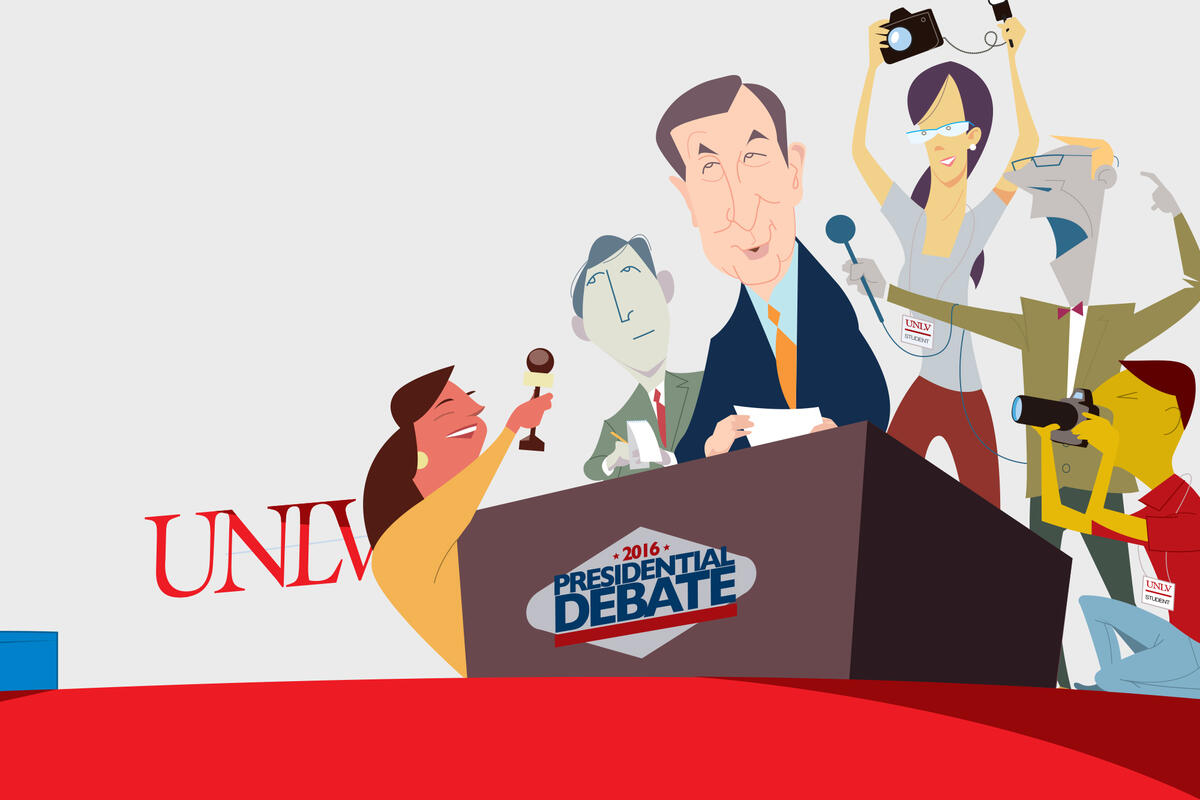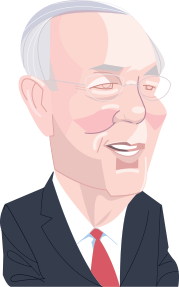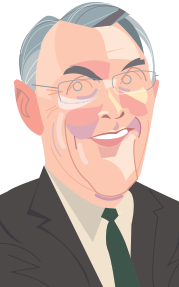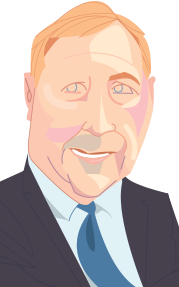In the more than 50 years since John F. Kennedy and Richard Nixon squared off on television, presidential debates have provided grand political theater. They are a crucial part of the American electoral process, organized with excruciating care to be nonpartisan and to help voters get a clearer sense of who they want to support and why.
On Oct. 19, for the first time, our campus will host a general election presidential debate — a made-for-television event expected to grab the world’s attention like never before. Hosted in partnership with the Las Vegas Convention and Visitors Authority, UNLV’s debate will occupy the most high-profile slot; it is the last of three presidential (and one vice presidential) debates during this unprecedented election season.
It is perhaps the most significant “real world” spotlight ever shone on Southern Nevada. It is a chance to show the nation UNLV’s progress in becoming a Top Tier research institution and the city’s stature as the ultimate location for events and meetings.
In August, UNLV Magazine gathered four of the people who made the debate possible. Here they discuss how UNLV landed the event and what it means for this university and this city.

How UNLV landed the debate
Fahrenkopf: Normally a year before the debates, we issue a request for bid to the universities and colleges across the country…I have always wanted to have a debate in my home state. So I picked up the phone and called [then-Interim UNLV President] Don Snyder, and said, “Don, I want Nevada to have a debate; could UNLV be in a position to host it?” Don ran with it and here we are.
The Application
The 19-page application and selection guidelines issued by the Commission on Presidential Debates is nothing if not specific: indoor humidity not to exceed 50 percent; quiet air conditioning set at a specific temperature range; fully carpeted floors; and “comfortable, fully padded seats with unobstructed views of the stage.” The venue must provide space for forty 53-foot-long mobile TV trucks and a media filing center for 3,000 journalists (Cox Pavillion will fulfill that need). And the hosting city must deliver 3,000 hotel rooms within 30 minutes of the venue — something Las Vegas offers in spades.
Snyder: I very quickly came to the conclusion that if we were going to do it, we’d need to have a partner. I felt that the [Las Vegas Convention and Visitors Authority] could see this as an opportunity to extend the brand of Las Vegas, while also extending the brand of UNLV.
Jessup: I’ve worked at University of Arizona, Washington State University — some of the PAC 12 schools that have looked at hosting debates before. They shied away from it. I knew that it was a daunting endeavor, but my resolve was strengthened knowing we had a partner with the LVCVA.
Ralenkotter: There’s never been a university and a destination marketing company coming together to co-host the debates. From our standpoint, because the business message is such an important part of Las Vegas, we thought putting the two brands together would be great. This enabled us to talk about business really being done in Las Vegas. And the prestige that comes with hosting a presidential debate just solidifies our message.
There are estimates that over 70 million people will be watching the debate that night — four times the number of people who watched the last World Series that went to seven games.
Campus Preparations
The LVCVA and UNLV are sharing the costs to produce the debate and are working together to secure sponsorships to offset outlays. The debate happens to coincide nicely with the completion of the Thomas & Mack’s $72.5 million renovation and expansion, which improved everything from the flooring to rafters and made numerous mechanical, electrical, and communications system upgrades. And, after years of deferred maintenance due to Great Recession-era budget cuts, UNLV is sprucing up campus and improving signage.
Fahrenkopf: Let me just add to what Rossi’s talking about. We estimate — we never know for sure — that there will be 2,500 to 10,000 reporters from all over the world coming to Las Vegas for the week. It’s just a remarkable opportunity to showcase some of the other things in Southern Nevada.
Jessup: We did some digging. Universities that had hosted before had calculated $50-$60 million dollars worth of earned media — basically free publicity to the university and the city. So we thought, “Well, this is just perfect. This university is working hard to become a Top Tier university, and we’ll get to tell that story to the world.”
Media and Marketing Bumps
Through September, UNLV’s debate had already generated $85 million worth of publicity. Hofstra University in New York just hosted its third straight presidential debate. During its 2012 debate, Hofstra’s website drew 150,000 visits, a 400 percent increase over usual traffic, and according to the Associated Press, the university’s enrollment applications climbed by 5,000 the following year.
The University of Miami, meanwhile, hosted a presidential debate in 2004 and received enough news coverage to fill two binders. Earlier this year it hosted a Republican primary debate, netting more than 2,400 mentions in news articles (a total ad value of just under $11 million), along with 16.8 million impressions on Twitter.
Ralenkotter: The bonus was being selected for the last debate of the season. It’s like the seventh game of the World Series — winner take all. There are estimates that over 70 million people will be watching the debate that night — four times the number of people who watched the last World Series that went to seven games.
Fahrenkopf: My prediction is it’ll be closer to 100 million.
Ralenkotter: That’s even better. That’s a hundred million people seeing a different side of who we are as a community.
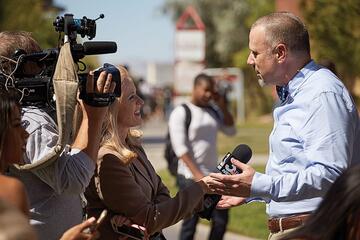
Live, From UNLV…
In addition to the thousands of journalists working from the debate’s media center and reporting with UNLV as their backdrop, major networks will be setting up stages in the days leading up to the debate. CNN will broadcast from the Lee Pascal Memorial Rose Garden on the northeast side of campus. MSNBC will stage its broadcast from the Alumni Amphitheater on the southeast side. Bloomberg News is planning segments from inside the Student Union.
UNLV’s student journalists — including a few who will report from inside the debate’s media center — are likewise part of the mix. More than 60 students are producing stories for UNLV-TV, KUNV radio, and other journalism school platforms. The debate also inspired the launch of the university’s first podcast UNLV: Different, Daring, and Diverse this fall with a dozen student hosts and contributors. Learn about UNLV’s transformation through the voices of our students on iTunes, Google Play, or your favorite podcast subscription.
Getting the student body involved
Jessup: The enthusiasm for this has spread like wildfire. In addition to the steering committee with campus and business and community leaders, we created a logistics committee and committees for campus engagement and voter education. These involve hundreds of students, faculty, staff, and community members. We did a launch event that went far beyond anything any other location has done. Once we hit the debate, they’ll have been working for a whole year in preparations.
Snyder: I’ve had a chance to work with the university one way or another for almost 30 years, and I have never seen a broader level of engagement and enthusiasm on campus than there is about this. It’s really extended far off campus. These are the things that we dreamed about when we first started talking about the debates in terms of enthusiasm and partnership.
Jessup: We have an army of students involved. I’ve always been a proponent of what faculty call experiential learning. So imagine being a student who wants to learn about politics, or about democracy, or about debates, and we give you opportunities to be involved in this. Imagine this being your first chance to vote and taking a freshman seminar on election issues. Imagine being a member of our nationally ranked debate team, which has been bringing top-notch high schoolers to UNLV for related events throughout the year. In one way or another, all of these students are participating in the final debate — some will even be lucky enough to be on the debate floor that night.
Our entire campus has a role in this presidential election of the United States of America; they’re all participating in the selection of what I think many people still feel is choosing the leader of the free world. What an experience!
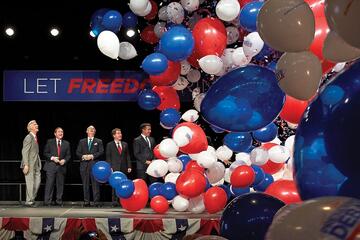
What’s at stake for the university?
Jessup: The debate is perfectly in the sweet spot of the university’s strategic plan to reach Top Tier status. That has several pathway goals — they evolve around excelling at research, providing a great student experience, launching a great medical school, and fostering community partnerships. We recognize that, for us to be a great university, we need the support of the community, and in turn, we have a duty to help the community get to the next level as well. That’s the story we get to show to the world.
Top Tier
UNLV has set its sights on being recognized as a Top Tier public university in research, education, and community impact by 2025. One measure of success will be when the university joins the 115 institutions (out of more than 4,600 in the U.S.) at the top of the Carnegie Classification of Institutions of Higher Education. It is a coveted feather in the cap for higher education, and UNLV would be the first in the state to achieve the designation (UNLV and UNR are both currently in the second tier). But more importantly, Jessup said, our Top Tier strategic plans will ensure the university enhances economic development efforts, fosters a climate of innovation, improves health care in the region, and enriches the cultural vitality of the community.
Snyder: As I travel around with my UNLV logo on my briefcase, people come up to me wanting to talk about Rebel basketball and about the 1990 NCAA championship team. Not to draw direct parallels to athletics, but this is at that level — it’s a championship event, a seventh game of the World Series equivalent — and I think people for years will be talking about the fact that we hosted the final debate in 2016.
Jessup: That’s a great example. The effects that [the 1990 NCAA championship] had on the campus enrollments, on applicants starting to apply from around the country — it put UNLV on the map, literally, from an enrollment point of view. UNLV merchandise started to be sold nationally; there were Rebel fans from all around the country and in other countries. This will do the same in terms of UNLV as a serious institution for research and community engagement, as a vibrant leader engaged in the conversations about government and our country’s future.
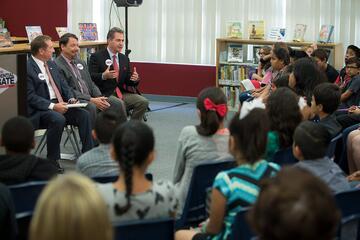
Getting the community involved
Jessup: [All of our committees] have heavy involvement with members from the community. Then, as an outgrowth, we partnered with the Clark County School District (CCSD) on a number of initiatives, and we kicked it off at the Paradise Elementary School, right on the northern edge of campus. Our students are helping the CCSD students learn about the debate and the role that the debates play in the democratic process — they’re engaging them in debates about the debates as they get ready to watch this debate.
Snyder: I’ll tell you, just sitting there, watching what was taking place at Paradise school that day — we saw second-, third-, and fourth-graders incredibly engaged in the conversation, in dialogue. I think that’s just scratching the surface of what we’re going to see in terms of youth paying a different type of attention to this campaign than they ever have before — just because of these types of partnerships.
Ralenkotter: It is also an opportunity for us at the LVCVA to explain how the room tax benefits everyone who lives in Las Vegas. Over the last 20 years, approximately $2 billion has been generated through the room tax for teachers’ salaries, for construction of schools. We’ve been able to get that message out to students and to their parents about how this community pulls together. All three of us (Ralenkotter, Jessup, and Snyder) are doing speaking engagements for different organizations like the Chamber of Commerce and so forth. We have a host committee of 1,600 residents who help us welcome people to Las Vegas; they’ll do an outreach throughout Southern Nevada.
And we’re reaching out to all of our corporate customers throughout the world. We have an ad campaign going in in-flight magazines. We’re working very closely with the airport for welcoming messages as the participants come in for the debates. The hotels are going to do the same type of a thing. We want to make everyone welcome, really hype the debate itself coming into town.
People think 18,000 seats means there’s going to be a lot of people there. They don’t realize this is a television event with a small live audience — not a live event that happens to be televised.
Difference between general election and primary season
Jessup: When I think back over the years and I compare (the general election) presidential debates like this to primary debates, it seems like the audience is quieter. In some of the primary debates, it seems like they just allow the audience to do whatever they want. There’s a lot of cheering and jeering and heckling and that kind of thing.
Fahrenkopf: The primary debates are run by the parties and the networks. These debates are much different. The moderator will come out, and he or she will talk to the audience about applauding and expectations about heckling. I must tell you, in 19 of them, there’s only been one time, really, that someone broke that rule. That doesn’t mean that if one of the candidates says something funny, the people can’t laugh. But there’s not to be any booing, clapping, cheering, or any of that kind of activity that would interfere with someone else’s ability to hear what the candidates have to say.
Before the debate begins, we usually have the university president and then the student body president come up and say a few words. Then we spend some time talking to the audience. Fundamentally, my message is, “You are very, very fortunate because you’re part of history here tonight.”
Volunteering
More than 1,000 students, staff, and community members applied for official volunteer positions, with hundreds more raising their hands to help in areas that don’t require security clearance. In the leadup to the debate, they’re helping with the dozens of debate-related events. On debate day, you’ll see them ushering, directing traffic, staffing Ask Me! booths, and serving as production assistants and interns for media and Commission on Presidential Debates staff. One of the more high profile positions, particularly for those who speak multiple languages, is as a student host for dignitaries from foreign countries participating in the CPD’s International Study Mission Program. The program provides about 60 international delegates with an insider experience on organizing political debates.
Tickets, please?
Snyder: People hear 18,000 seats and think there’s going to be a lot of people there. They don’t realize this is a television event with a small live audience — not a live event that happens to be televised.
Jessup: We had season ticket holders for Rebel basketball ask if they could sit in their seats, or if they could rent one of the suites for hosting a party to watch the debate. Even if the Secret Service would let them in, they wouldn’t see anything because everything will be draped down on the floor in the arena to create a studio for television.
Fahrenkopf: We get the same question everywhere else, “What do you mean there’s only going to be a thousand tickets?” The actual number all depends on the facility, the security needs, the construction of the boxes for the networks. It depends on where the Secret Service wants to cut off access and hang drapes and so forth. We had 1,200 or 1,300 (tickets) one time; the smallest was 600. Assuming for the moment that we only have two candidates…One-third of those tickets, traditionally, will go to the Democratic nominee, one-third of the tickets will go to the Republican nominee, and one-third will be split between the sponsoring school and the Commission on Presidential Debates.
Jessup: Again, since we want this to be a learning experience, our priority is making sure our current students are able to attend. We’re distributing them to full-time students through a computerized lottery.
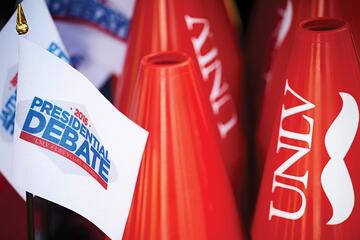
On staying on neutral ground
Jessup: The activities leading up to the debate present a challenge to a university campus in the United States, because we are typically the place where free speech is celebrated and so we allow really any speaker on almost any topic to be heard. That’s just systemic. It’s in the DNA of American universities. From a university administration level, we’ve had to be careful about what we put out regarding anything in the political arena, anything that might be perceived as being a little too conservative or a little too liberal, without infringing on faculty and student expression of opinions.
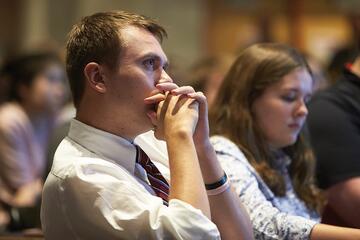
Reinventing ourselves (again)
Ralenkotter: If you look at our history, one of the things that really has made Las Vegas successful is we keep reinventing ourselves. Coming out of the recession, all the challenges we had as an industry on all market segments — we really had to reach out to our customers and talk about all the new things that Las Vegas has and has to offer. We also looked at how we could improve our current market base; and this is where the real opportunity is with this. There’s a national movement by all the convention bureaus in the United States to push the message that meetings mean business, that things get done when you meet in person. We’ve been hammering that message time and time again. This is an opportunity to say that, “Guess what? Las Vegas hosted a presidential debate. Serious business gets done in Las Vegas.”
Snyder: This is a classic example of looking at the opportunity and doing something even more with it. That’s what Las Vegas is, and what UNLV is.
Ralenkotter: The debate is another thing that adds to our resume. There’ll be future debates in Las Vegas — guarantee it. There’ll be a presidential party convention. This really sets us apart, showing people that Las Vegas can host almost any type of activity or event — including serious business events.
When the cameras turn off…
Jessup: Whether they’re watching on television or they happen to be lucky to be there in person — the journalists included — I hope people come away saying, “I didn’t realize how beautiful that UNLV campus is and how great that university is. I knew they had a basketball team and a top hotel program; I had no idea about their creative writing program and that they’re launching a medical school.” It might influence somebody to think, “I might have my son or daughter apply for school there.”
Ralenkotter: We want them to say that Las Vegas did a great job hosting, as we always do, and that we certainly do have a dynamic community. If they take those two things away, I think we will have exceeded all of our expectations.
Snyder: I’ll speak as a community member: I want the community to be really proud of itself. We have an opportunity to showcase ourselves around the world, but we also have a chance to showcase the community to ourselves. I want the community to walk away thinking, “Wow, look what we did!”
Fahrenkopf: Let me do clean-up here. [The commission does this] as an educational function. We are hopeful that, when this is over, those people who watched it in person or on television or on their computers have learned something about the candidates and that what they’ve learned can contribute to their being good citizens and going out and voting. That’s number one.
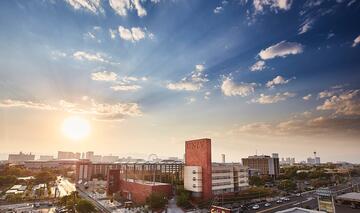

And there’s more
Wondering when politicians began dressing down on the campaign trail? How gaffes have plagued presidential hopefuls? Or why Nevada is such an oft-visited state? The UNLV News Center has been interviewing our experts, capturing student experiences, and digging into some off-beat election history. Read the stories online.
